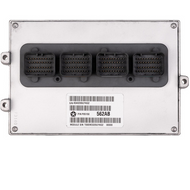Common Symptoms of a Bad Jeep PCM (and how to fix)
25th Aug 2025
Automotive electronics can be extremely complex. Even the simplest vehicles require a large variety of systems to work together in order to ensure safe and efficient operation. At the heart of these systems lies the powertrain – the group of components that generates and delivers power to the wheels. The powertrain consists of the engine, transmission, driveshaft, axles, and differential. All of these parts are critical in ensuring drivability, and if any one portion of the system is broken, the entire vehicle could become inoperable. The PCM (Powertrain Control Module) is the central “brain” behind all of these components.
What is the PCM on a Jeep Grand Cherokee?
The PCM gathers data from a variety of the vehicle’s sensors including vehicle speed, throttle position, oxygen levels, etc. It then uses that data to adjust the operation of the engine and ensure proper performance. On many year models of the Jeep Grand Cherokee, the PCM controls the ignition coils, handles the charging functions of the alternator, and is responsible for various other aspects of powertrain operation.
What is the difference between a Jeep PCM and ECM?
The terms “PCM” and “ECM” are often used interchangeably, but these modules are different, and have different roles. As mentioned, PCM means “Powertrain Control Module”, and the term ECM stands for “Engine Control Module”. While a PCM is responsible for multiple systems including the engine and transmission, an ECM is only responsible for the engine. It’s important to note that vehicles will have either one or the other – not both. For example, the 2009-2013 Jeep Grand Cherokee uses a PCM instead of an ECM.
How do you tell if a Jeep PCM is bad?
The most common symptoms of Jeep PCM failure are: coil driver failure, coil driver misfire, or the alternator not charging the battery (code P0622). Usually, the first indication of coil failure is a rough, shaky driving experience and the engine noticeably misfiring or sputtering during acceleration. If you are dealing with this issue, scan the vehicle for codes. If there are any codes, research their meaning for your exact vehicle. A bad PCM will usually result in codes relating to the ignition coil primary/secondary failures.
Can I drive a Jeep with a bad PCM?
In theory, you should be able to drive with a faulty PCM, but this of course depends on the extent of the failure. If the PCM is preventing the battery from charging, then your vehicle will be unable to start or operate properly. If your vehicle is experiencing coil driver failure or misfire, then continued use could lead to further damage. The engine is not designed to operate under these conditions. It’s strongly recommended to resolve your PCM issues and any failed ignition coils as soon as possible.
Do you need to replace all of the ignition coils with the PCM?
PCM problems are often caused by a failed ignition coil. If this is the case, you must change all ignition coil packs at the same time as the PCM to prevent any further damage. We strongly recommend using OEM replacement ignition coil packs and spark plugs. Neglecting to change out all the ignition coil packs could cause your replacement or repaired PCM to fail again, so this is a very important step to get your vehicle back up and running.
Can a Jeep PCM be repaired?
Yes! Most Jeep PCMs can be repaired. This is often a much more affordable route than finding a new replacement, and is definitely more reliable than any used PCM. At Circuit Board Medics, we commonly repair a wide variety of Jeep PCMs including the Wrangler, Liberty, and Grand Cherokee PCMs. The process is straightforward. You simply place your order, ship your module to us, and we’ll repair it in one business day and ship it back to you – complete with a one-year warranty. A major benefit of repair rather than replacement is that your programming will be retained, and your existing key(s) will work upon re-installation. Just plug it back in and you’re all set. If you’re ready to get your PCM repaired and restore your vehicle, you can find your exact part here, or give us a call at (800) 547-2049. We look forward to serving you!

